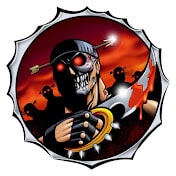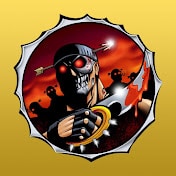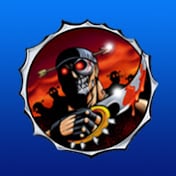If you were a young writer with dreams of making it big in Hollywood, you couldn’t have a much better origin story than Shane Black. Just out of film school in his early 20s, Black famously sold his spec script Lethal Weapon to producer Joel Silver and Warner Bros., nabbing over $200 thousand for his work. Lethal Weapon was a significant hit in 1987, effectively putting Black on the map; combine that with the fact he also co-wrote The Monster Squad and starred in and script-doctored Predator that same year and you have a very nice start to a career.
In the 90s, Black became famous—or infamous—for two blockbuster screenplay sales. The Last Boy Scout sold for a record $1.75 million, a record at the time. A couple of years later, his script for The Long Kiss Goodnight made history when he got paid a whopping $4 million for it, still a huge number to this day. But after that film flopped at the box office, Black seemingly fell off the map, retreating to his posh home in Hancock Park and for years not poking his head out of obscurity, except to maybe throw a lavish party. “Whatever happened to Shane Black?” was a question asked by film buffs everywhere in the late 90s—the wunderkind had apparently burnt out all too quickly.
Thankfully, Hollywood loves a good comeback story, and we all know Black didn’t stay down for long. In 2005 he hit us with Kiss Kiss Bang Bang, a snarky, cynical, frequently hilarious riff on romantic comedies and film noirs starring two of Hollywood’s most notorious bad boys. If it didn’t make a huge impact upon its release, it would prove to be vital for resurrecting not just Black’s career, but that of his leading man’s as well. So put down that Johnny Gossamer paperback and join us as we find out just What Happened to Kiss Kiss Bang Bang.
In the years after the big payday for The Long Kiss Goodnight—and its subsequent failure at the box office—Black retreated from public life and struggled to write for a time. He assumed that because of the content of his movies and the tremendous amount of money paid for his scripts, he was thought of as a hack, a brat who got too rich, too quickly. He tried to join the Academy and was rejected—an understandable blow to his ego. Black would later admit his feelings were hurt over the backlash in the press to his success and wanted to try his hand at something different. He felt the need to write a quote-unquote “real” movie that would impress the town, which would then open its arms to him again. He started writing a romantic comedy that had none of the action set-pieces or R-rated comedy that his scripts were known for; as he put it, it was a heartfelt romance about two quirky kids in L.A. He showed it to his friend and mentor James L. Brooks, the director of Terms of Endearment and Broadcast News, and while the famed director liked it, he thought it lost its way about halfway through. And Black agreed with him.
At a certain point, Black decided to put a dead body in the story, obviously changing the trajectory of it. He added the character of a tough private eye, a character ripped from the dime-store paperbacks Black used to read as a kid. However, Black decided to make the private eye gay, a subversive flourish he had never seen in this type of movie before. Before he knew it, Black was writing what he’d later describe as a romantic comedy version of Chinatown. He called his script You’ll Never Die in This Town Again. Shane Black was back.
Like many Black stories, his latest was to combine a convoluted plot with snappy banter, violent shootouts, and, most crucially, a humorous love-hate relationship between two vivid protagonists. The lead was Harry, a petty New York thief who unexpectedly finds himself attempting to solve a murder in Hollywood alongside a no-nonsense private detective affectionately known as “Gay Perry.” And just like most of Black’s tales, this one took place during the Christmas season.

Black would later admit the structure of the plot was cribbed from a 1940s paperback mystery called Bodies Are Where You Find Them, and the whole project was inspired by the pulpy books he grew up on. But the quirky personality of the film would be all his.
With the script in good shape in 2001, Black sent it around town to producers he’d worked with in the past. Only trouble was, none of them would read it—and if they did, they wouldn’t get back to him. According to the writer, one executive told him he wasn’t interested because his studio wasn’t doing period pieces anymore. Considering the fact it wasn’t a period piece, that signified to Black that the executive hadn’t even bothered to read it. Black was concerned that his stalled career would never rev up again.
But an old colleague returned to bail him out. Joel Silver, now hot off the success of The Matrix, agreed to take the project on. A May 2003 Variety article announced that Silver had agreed to produce You’ll Never Die in This Town Again for Black, reuniting the two after many years of not working together. For his part, Silver felt he owed something of a debt to Black; Lethal Weapon had changed the trajectory of Silver’s career and turned him into the super-producer he was, so helping his old friend out made sense—even if the material wasn’t exactly the stuff blockbusters are made of.
Black eventually changed the title to Kiss Kiss Bang Bang, which was the name of a James Bond song in the 60s and an international nickname for the character; journalists used to snidely refer to him as “Mr. Kiss Kiss Bang Bang.” Black liked this new title because he felt it summed up the movie, which was half-romantic comedy, half-thriller. Kiss Kiss Bang Bang was also the title of a book of reviews by the famed critic Pauline Kael, and when it was revealed to be the title of his new movie, Black claimed he received hate mail from people who thought he was somehow denigrating the beloved critic.
Nevertheless, Kiss Kiss Bang Bang was a go at Joel Silver’s home studio, Warner Bros. The budget was set at $15 million, proof that the studio didn’t intend to spend very much on the project; after all, this was the same time they were making movies like Batman Begins, Charlie and the Chocolate Factory, and Harry Potter and the Goblet of Fire, all of which came with rather hefty price tags.
But the budget would also depend on the leading men in the film; if they could attach some bankable names to the project, the money might flow a little more freely from the studio. One surprising actor attached for a while was Johnny Knoxville, then a household name for anyone who watched the ridiculous exploits of Jackass. Another name attached was Benicio del Toro, but how serious his flirtation was with the project is hard to say.

Black was in the process of auditioning actors at Silver’s office on the Warner Brothers lot when he noticed the frequent presence of Robert Downey Jr. in the building. Downey was dating Silver’s right-hand woman at the time, Susan Levine—the two met while making the horror film Gothika, which she produced and he co-starred in. Black asked Downey if he would read some lines from the script while he was hanging around and became instantly enamored with the actor’s take on Harry.
For his part, Downey already knew about the screenplay. In a later interview, Downey said that he would hear Susan laughing to herself as she was reading the script, something that was unusual for her. When she described the wild events contained in the screenplay, Downey was intrigued and wanted to be involved. The actor, of course, was not the RDJ we all know and love today; in the early 2000s he was still attempting to clean up his act and career, and by the time Kiss Kiss Bang Bang rolled around he’d just gotten sober.
Warner Bros. didn’t view him as a bankable star, so the budget would remain in the $15 million range—unless they could get a bigger name to play Gay Perry. Evidently, Black and Silver searched for such a star for months but couldn’t get anyone to agree to take on the role; eventually, Val Kilmer’s agent contacted them and notified them of the actor’s interest and availability, prompting Black to cast the actor, notoriously a handful on set. Now the studio was looking at a novice director in charge of a major motion picture with two actors who weren’t exactly known for being easy-going fellas. It’s no wonder they were only willing to commit $15 million to it.
The other missing piece would be the lead actress for the role of Holly, Harry’s childhood friend and later love interest. Black claimed the studio didn’t require a big name for the female lead so all he had to do was find the right actress. Michelle Monaghan, who Black had never even heard of up until that point, came in and auditioned and knocked it out of the park. A few months later, she read three scenes with Robert Downey Jr. and based on that small sample, she got the part.
Though it was his first time sitting in the director’s chair, Black ultimately found the job surprisingly easy. He prepared thoroughly during pre-production and later said it turned out to be a breeze and wondered why it had taken him so long to do it. He even shot the film’s extravagant party sequences at his own home, perhaps to save on budget, but also as a sly reference to some of the over-the-top gatherings he’d personally become known for throwing. Supposedly, a party at Shane Black’s house could get just as wild as one at the Playboy Mansion.
Black’s tribute to dime-store paperbacks didn’t stop at the material—he paid a debt to author Raymond Chandler by naming the film’s chapter titles after Chandler books: Trouble Is My Business, The Lady in the Lake, and so on. Black viewed the film as a celebration of detective novels, as well as something of a cheeky love letter to his longtime home, Los Angeles.
Thanks to a generally smooth production despite the relatively small budget, Black was convinced he’d made the movie he’d been dreaming up for a couple of years. Despite his leading men’s reputations, Black found the two actors agreeable to work with; most importantly, all three leads had excellent chemistry with one another, which was essential to its success.
Kiss Kiss Bang Bang premiered at the 2005 Cannes Film Festival, out of competition. It received an enthusiastic response from the filmgoers there, but not so much that Warner Bros. was willing to give it a wide release. In fact, when the time came to put the film in theaters in October of that same year, Warners decided to roll it out as a platform release, putting it out in only eight theaters. It performed respectably opening weekend, making $180 thousand from those theaters, and though Warners did add theaters during the ensuing weeks, it never went wider than 226 theaters. Kiss Kiss Bang Bangwas never really given a chance to reach a mass audience, and it ended its run with only $4 million in the U.S.
Low box office aside, the movie won over plenty of critics and film geeks. Robert Downey Jr. later admitted to being disappointed with the lukewarm reception, having hoped it was going to be the moment he re-entered the Hollywood A-list. However, appearing in Kiss Kiss Bang Bang still ended up changing his life forever—his performance caught the attention of Jon Favreau, then prepping Iron Man, who later made the controversial decision to cast RDJ as Tony Stark. Iron Man would, of course, become a massive success and propel Downey to international superstardom. As he later said, Kiss Kiss Bang Bang ended up being the calling card that led to Tony Stark and ultimately his complete reinvention.
And obviously, it would change things drastically for Black as well. Though he too was massively disappointed with how Kiss Kiss Bang Bang was received at the box office, it would turn out the newly successful Robert Downey Jr. would return the favor in a pretty big way. In 2010, Downey called Black out of nowhere and said he wanted the writer to pen an Iron Man movie. That became 2013’s Iron Man 3, which would gross over a billion dollars at the worldwide box office.
So, one might say we have Kiss Kiss Bang Bang to thank for Robert Downey Jr. being cast as Tony Stark, which led to the entire overall success of the MCU. That might be a lot to hang on a tiny $15 million movie’s shoulders, but like its characters, it’s tough enough to take on such a responsibility.






























Follow the JOBLO MOVIE NETWORK
Follow us on YOUTUBE
Follow ARROW IN THE HEAD
Follow AITH on YOUTUBE